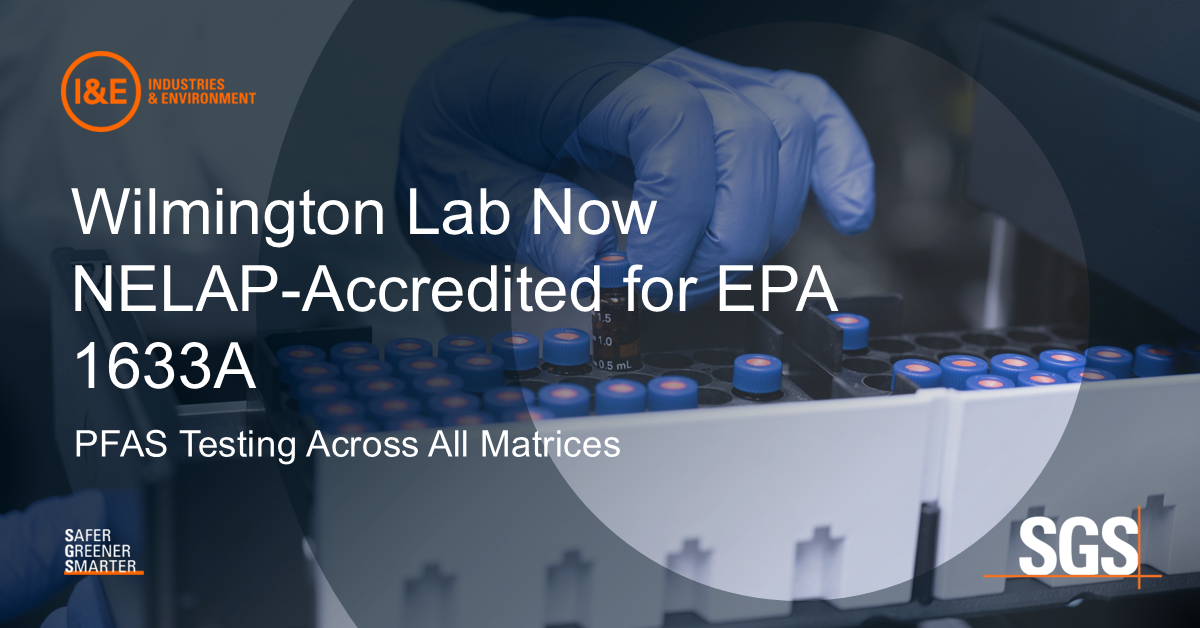SGS Expands PFAS Testing Network with 1633A Accreditation at Wilmington Lab
SGS North America is proud to share that our Wilmington laboratory has achieved NELAP accreditation for EPA Method 1633A, covering Aqueous, Solid, and Tissue matrices.
This accomplishment supports our ongoing investment in a coordinated PFAS testing network across North America bringing our total number of 1633 -accredited labs to seven with more to come!
With this lab’s demonstrated ultratrace analytical expertise and its prior accreditation for EPA Methods 533 and 537.1, clients now have access to fully accredited, reliable PFAS analysis across all major sample types.
Explore our PFAS services or contact us to get started.
PFAS Testing Q&A
Q: What’s new at SGS’s Wilmington laboratory?
A: Our Wilmington laboratory is now NELAP-accredited to perform EPA Method 1633A for Aqueous, Solid, and Tissue matrices. This achievement expands our PFAS testing capabilities and reinforces our role as a leader in ultratrace environmental analysis.
Q: What is EPA Method 1633A?
A: Authored by SGS, method 1633A is the U.S. EPA’s most comprehensive method for identifying and quantifying 40 target PFAS compounds across multiple environmental matrices. It is currently the industry standard for non-drinking water PFAS analysis and is widely referenced by state and federal programs.
Q: Why does Wilmington’s accreditation matter?
A: Accreditation means clients can count on defensible, regulatory-ready data from a trusted source. Wilmington’s accreditation across three of the most commonly tested matrices, Aqueous, Solids, and Tissues, gives SGS added capacity in a key geographic region and offers more flexibility for sampling programs.
Q: How does this fit into SGS’s broader PFAS strategy?
A: Wilmington is now the third SGS lab accredited for Method 1633A and the tenth SGS PFAS laboratory in North America. This is part of our ongoing PFAS expansion strategy, which includes:
- A nationwide network of coordinated laboratories
- Capacity for high-volume or emergency-response PFAS projects
- Method development, validation, and client support
- Accreditations for EPA Methods 533, 537.1, and 1633A
More SGS labs are preparing for 1633A accreditation to further support clients across North America.
Q: What are PFAS, and why is testing important?
A: PFAS (per- and polyfluoroalkyl substances) are a large class of human-made chemicals known for their persistence in the environment and the human body often referred to as “forever chemicals.” They’ve been widely used in firefighting foams, non-stick cookware, waterproof fabrics, and industrial processes.
Due to emerging health concerns and evolving regulations, PFAS testing is now essential for:
- Environmental compliance
- Site investigations and remediation
- Drinking water protection
- Wastewater and biosolids monitoring
- Risk assessment and litigation support
Q: How can I get started with PFAS testing at SGS?
A: Whether you’re dealing with complex site work, regulatory deadlines, or long-term monitoring, SGS has the capacity and expertise to support your PFAS testing needs. Connect with one of our PFAS experts to:
- Get a quote
- Review matrix-specific guidance
- Plan your 1633A sampling strategy
- Learn more about our network of PFAS labs

